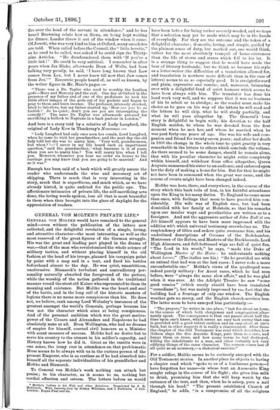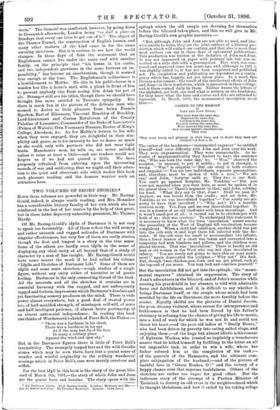GENERAL VON MOLTKE'S PRIVATE LIFE.* GENERAL VON MOLTKE would have
remained to the general mind—even without the publication of the letters now collected, and the delightful revelation of a simple, loving, and attractive character—the most interesting as well as the most reserved of the great figures of the German struggle. His was the great and leading part played in the drama of war,—that of the man who revolutionised the whole science of military tactics, and without placing himself in the old fashion at the head of his troops, planned his campaign point by point with a map and in a tent, and fixed his battles beforehand almost to the day. He was quiet, unambitious, unobtrusive. Bismarck's turbulent and contradictory per- sonality naturally absorbed the foreground of the picture, while the worship of the nation gathered in the traditional manner round the stout old Kaiser who represented to them its meaning and existence. But Moltke was the heart and soul of the battle, and in the long roll of the historic masters of legions there is no name more conspicuous than his. He does not, we believe, rank among Lord Wolseley's instances of the greatest amongst the world's Generals, perhaps because his was not the character which aims at being conspicuous. And of the personal ambition which was the great motive- power of the Canars and .Alexanders and Napoleons he had absolutely none at all. Even Wellington, who had no dreams of empire for himself, courted civil honours as a Minister with scant measure of success. Moltke had no desire but to serve his country to the utmost in his soldier's capacity, and History knows how he did it. Great as the results were in one sense, the irony ever in attendance on that problematic Muse seems to be always with us in the curious person of the present Emperor, who is as restless as if he had absorbed into himself all the separate individualities of his grandfather and Moltke and Bismarck.
To General von Moltke's work nothing can attach but praise; to his character, as it seems to us, nothing but cordial affection and esteem. The letters before us would
• Moltke's Letters to his Wife and other Relations. Translated by J. R. MeItraith. With Introdurtion by Sidney Whitman, and 2 Portraits. 2 yols. London Regan Paul and Co.
have been better for being rather severely weeded, and we hope that a selection may yet be made which may be in the hands of everybody. For they are the outcome and the token of a delightful character ; domestic, loving, and simple, guided by the plainest sense of duty, but marked out, one would think, rather for the most absolutely tranquil of home existences than the life of storm and stress which fell to his lot. It is a strange thing to suggest that be would have made the best of literary husbands ; but we think so because his style as a letter-writer (the difficulties of a translation allowed for, and translation is nowhere more difficult than in the case of letters) seems to us so especially good. It is straightforward and plain, expressive and concise, and, moreover, brimming over with a delightful fund of quiet humour which seems to have been always with him. The translator has done his hard work very well, and we suppose that it was no business of his to select or to abridge ; so the reader must make his choice as he goes on his way of the letters he will read and the letters he will skip, what he will study partially, and what he will pass altogether by. The General's Jove.
story is delightful to begin with; his devotion to the half English maiden, to whom he was devoted from the first moment when he met her, and whom he married when he was past forty-one years of age. She was his wife and 'com- panion and friend for twenty-seven years ; and after her death in 1868 the change in the whole tone to quiet gravity is very remarkable in the letters to others which conclude the volume.
As there seemed to be some danger, should he remain alone, that with his peculiar character he might retire completely within himself, and withdraw from office altogether, Queen Augusta summoned his sister to an audience, and enforced upon her the duty of making a home for him. Bat for that he might
not have been in command when the great war came, and the course of events might have been changed indeed.
Moltke was here, there, and everywhere, in the course of the story which this book tells of him, in his faithful attendance upon the King in his many duties. To England he came more than once, with feelings that seem to have puzzled him con- siderably. His wife was of English race, but had been
domiciled with her family at Holstein, BO that his remarks upon our insular ways and peculiarities are written as to a foreigner. And not the aggressive author of John Bull et son Isle himself appears to have been more impressed with the
oddities with which universal testimony overwhelms us. The resplendency of titles and orders quite overcame him, and his underlined descriptions of Grooms of the Bedchainber, Mistresses of the Robes, and Masters of the Buck hounds, Lord
High Almoners, and full-bottomed wigs are full of quiet fan. "The Lord in his wrath," he says, "made the Duke of Wellington Master of the Horse : he understands nothing about horses." (The italics are his.) "So he provided me with an animal that had won at the last races : I never rode a more uncomfortable one." Moltke's views of the quadruped were indeed purely military : for Ascot races, which he had seen
before, were "always the same slow affair," and he was glad
when it was over. At the Adelphi Theatre he saw '4 some good comics" (which surely should have been translated
"comedians "), but was mainly impressed by tit., fact that the building had a frontage of only one window. The English weather gets no mercy, and the English church-services less.
The latter seem to have annoyed him particularly :—
" The prayers," he writes in one place, "last for about an hour, in the course of which both clergyman and congregatiort alter- nately speak. The consequence is that one passes about half the time upon one's knees, which seems an easy task seeing that one is provided with a good velvet cushion and an easy-chair at one's back, but in other respects it is really a chastisement. After these the chapter of the Old Testament was read which describes how Gideon slays the five Amorite Kings, puts them in a cave, and hangs them on trees, and how many towns he had destroyed, killing the inhabitants to a man, and other certainly not very edifying things of the same character. The sermon comes last of all quite as an accessory,—a rhetorical exercise."
For a soldier, Moltke seems to be curiously annoyed with the Old Testament stories. In another place be objects to having
a chapter read which "spoke to us of a loathsome perm:a:174 have forgotten her name—in whose tent an Ammonite ring sought refuge in the course of his flight ; she gives him milk to drink, promising him that she will keep watch by the entrance of the tent, and then, when he is asleep, puts a nail through his head." "The present established Church of England," he adds, "is a compromise of all the religious
sects." The General was comforted, however, by going down to Greenwich afterwards, London being "so dull a place on Sundays that every one tries to get out of it." The object of the Thames Tunnel, the construction of English houses, and many other matters of the kind come in for the same amusing strictures. But it is curious to see how the world changes. In these days of flats the statement that an Englishman cannot live under the same roof with another family, on the principle that "his house is his castle, and two independent garrisons in the same fortress an im- possibility," has become an anachronism, though it seemed true enough at the time. The Englishman's solitariness is a bewilderment to Moltke. He sits in his public-house in a wooden box like a horse's stall, with a plank in front of him to prevent anybody else from seeing him drink his pot of ale. Stranger still are his titles, though there we should have thought him more entitled to Teutonic sympathy. But there is much fun in the picture of the delicate man who seemed to derive so little pleasure from being Francis Egerton, Earl of Ellesmere, Viscount Brackley of Bra.ckley, Lord-Lieutenant and Custos Rotulorum of the County Palatine of Lancaster, Commander of the Duke of Lancaster's (Prince of Wales's) Own Yeomanry Hussars, Rector of King's College, Aberdeen, &c. As for Moltke's letters to his wife when they were engaged, they are delightful in their sim- plicity and grace, as is his entreaty to her to dance as much as she could, only with partners who did not wear tight boots. Manchester men, he tells us, are never satisfied unless it rains at least a little—and our readers would not forgive us if we had not quoted a little. We have purposely refrained from entering upon the interesting records of war and soldiering, that we might call their atten- tion to the quiet and observant side which makes this book such pleasant reading, and the famous warrior such an attractive hero.











































 Previous page
Previous page